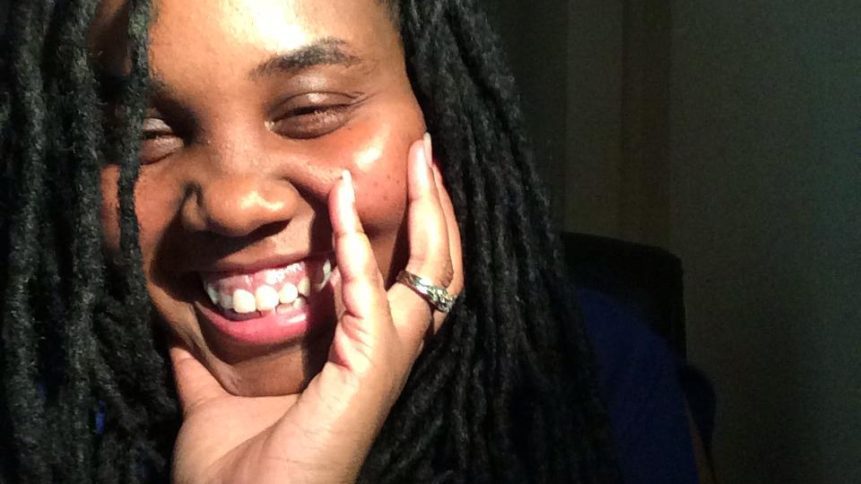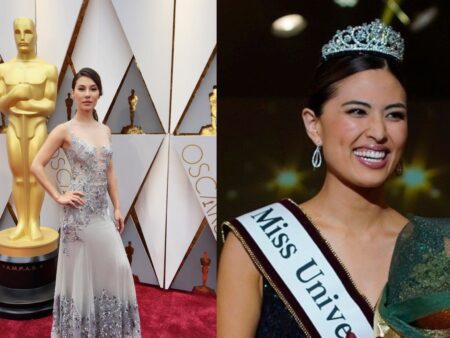
Regina Townsend is passionate about bringing light to the struggle of infertility in the African American community. Through her advocacy and her health blog, she’s committed to connecting people to the resources they need to make informed health decisions.
One reason Regina started the Broken Brown Egg blog in 2009 was because she was sick of the silence around infertility and the misconception that black women got pregnant (too) easily.
Her blog now proudly supports the mission of encouraging, “African Americans to begin this very important dialogue of reproductive health and fertility by raising awareness, hope and activism.”
After years TTC, Regina and her husband Jahbari welcomed their long-awaited son, Judah.
We caught up with Regina to hear more about where she is today, why she’s still using her voice to advocate for visible minorities who are battling infertility, and how she is navigating parenthood after infertility.
When and why did you start the Broken Brown Egg blog?
I started the blog about 8 years ago. I’d been a part of an online community called “Chocolate Brides”, where women of color shared their wedding planning journeys and more. A lot of us would stick around, even after getting married, and it was really just this great (pre-Facebook) social community of women. While it was called chocolate “brides”, there was a wide array of experiences represented: single women, divorced and divorcing women were part of the community.
On Chocolate Brides, you could keep journals for planning your wedding, decorating your house, personal journeys, and pregnancy and get support and encouragement and whatever else you needed. It was on CB where I first heard black women talking about IVF, or about infertility at all. Because of the conversations on that site, I was a bit more aware of what I should think about when my husband and I started trying, and it gave me more perspective. When we started having difficulty, I was furious that no one had told me BEFORE. I was angry that people assumed things. I was frustrated that people just didn’t talk about it. So, I started posting things on my Facebook page, and I got a lot of likes from people who I knew behind the scenes who were struggling, too. Then I just started writing about it. I felt like I had to talk about it as a way to fight back against it.
You’ve said that you used to hear that it’s easy for black girls to get pregnant. Can you expand on this, and share why you’re bringing more awareness to the challenges of this community, in particular?
In my experience growing up in the south side of Chicago, I felt strongly aware of a stereotype of black women, especially those that come from urban environments, that we were hyper-fertile. Before “Teen Mom” was a glorified reality show, it (teenage pregnancy) was an issue that many of my friends and I were taught to be most afraid of – because it was something we were allegedly highly susceptible to. We knew that getting pregnant would derail you from college, from career, and from choices.
I’d never really thought about black women dealing with infertility because for my entire life, the narrative I’d always heard among me and my friends was “Don’t Get Pregnant”, as if it were extremely easy, and also the worst thing that could happen. IVF was considered an expensive, luxury route for an issue that I didn’t know even affected us.
I’d never really thought about black women dealing with infertility because for my entire life, the narrative I’d always heard among me and my friends was “Don’t Get Pregnant”, as if it were extremely easy.The largest part of what I wanted to do with The Egg blog, was show that this is what infertility looks like. It looked like the aunt who loved all her nieces and nephews but never had her own. It looked like the beloved teacher who mothered all of their students, but avoided baby showers. It looked like being uncomfortable with how uncomfortable back to school photos were becoming. It was all of these things, and it was indiscriminate of race. Infertility is lonely enough as it is; so to be in this small group, and then also not see anyone that looks like you…I just hated that. So, that’s what I fought against — the silence and the invisibility.
You were one of the judges of Sher’s free IVF contest shown in the movie “Vegas Baby.” Why did you get involved in this contest?
I was a judge in that ‘free IVF’ contest. And honestly, it was a difficult decision to make and one that I reached out to a few others in the advocacy community for advice about before agreeing to. I wasn’t sure how I felt about it, and whether or not participating would be harmful or helpful to the infertility community.
One of the best ways someone put it to me was that for many of these families, this was about even more than getting the treatment. For many, if not most of them, making these videos (submitting their application for the contest) was their way of coming out of the infertility closet. It was their way of announcing to friends, family, co-workers, and the world that this what they were dealing with every day. This issue came with them to work, it came on family vacation with them…it was with them every bit of their marriage. In the end, I realized that for many of them, this contest was their way to be heard; and if they didn’t receive the IVF from Sher, they would continue to try, regardless. While some were uncomfortable with the “contest” feeling of it, I felt it was a huge self-advocacy vehicle. I was skeptical until the moment I was there, and talked to others who’d made videos before, and also after I talked to Dr. Sher and learned more about the others who’d agreed to participate.
Your blog’s headline is ‘Awareness. Hope. Activism.’ How do embody this mission?
My whole journey into infertility, and meeting all of the other people who were battling it, was a huge AHA moment for me. I chose to build on that. I was not the best at planning huge events, or making grand donations; but I realized that I was good at connecting people. I knew I could help researchers connect with real women of color who were dealing with infertility, or I could help people find the organizations that gave grants. I was good at being honest about what I was feeling about my own infertility, and helping other people get the courage to speak up also (or good at just giving them something they could click “like” on).
I realized through this experience that this gave people hope – knowing they’re not alone or crazy for feeling the way they did.I realized through this experience that this gave people hope – knowing they’re not alone or crazy for feeling the way they did. I also started telling people the importance of self-advocacy. It was important to speak up with your doctors, and tell people what you were feeling, or at least just being honest with YOURSELF. Being honest was huge for me, and I knew it could be liberating for others also to feel like they were being active and taking control of their family building plans.
Where are you now in your fertility journey?
My husband and I underwent IVF in 2015, and our son was born in June of 2016, seven years to the day that I started my blog.
For the past year, I’ve really been in an uneasy space with my infertility. I’m not sure where I fit anymore, and I’ve been fighting a horrible struggle with postpartum depression and anxiety — some of which I strongly believe is a result of having gone through so much to get pregnant in the first place, along with the guilt of “leaving” so many other friends and groups still fighting this fight. What do I share? What don’t I share? Do I post pictures of my son, when I know how difficult that was for others? Or, is not posting things patronizing?
Parenting after infertility, or really while enduring it, is a whole other monster because babies don’t cure infertility. My tubes are still blocked, I still have PCOS, and my husband still has his own issues with diabetes and sperm counts.
So, while the small group of “mom friends” I’ve made contemplate whether or not they’ll start trying for baby #2, I am reminded that I still have to look at things differently. My husband and I still have embryos to decide what we’re going to do with. Trying to navigate post-partum, under the additional weight of infertility has been a struggle for me. To be honest, I’m still trying to figure out what to do next. I don’t know what the right move is. I want to still be a support, but I also don’t want to inadvertently offend.

Listen to stories, share your own, and get feedback from the community.


















